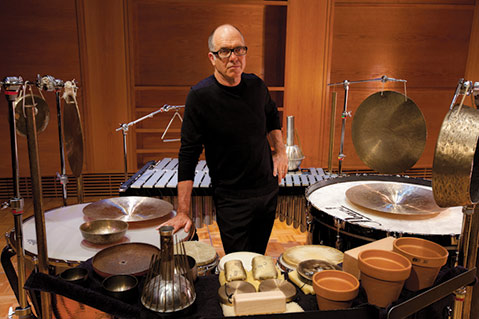The Ojai Music Festival 2015
The Four-Day Event Takes Place June 10-14

As Steven Schick, music director of this year’s Ojai Festival, is acutely aware, there is a kind of duality to being a classical percussionist. Drums, gongs, and cymbals have traditionally been on the periphery of classical music; solo instrumentalists are, in a very real sense, pioneers. And yet, they’re engaging in what may be the oldest musical tradition in human history.
“That tension is part of my daily life,” Schick said in an interview from San Diego, where he is on the faculty of UCSD. “I get up every day and I practice. That connects me with generations and centuries and millennia of percussionists all around the world. Whether they were African drummers or Balinese gamelan players, they basically did the same thing with their hands that I do: They pick them up and let them fall. At the same time,” he continued, “there’s also a ceaseless experimentation [in my work] — a quest to reinvent things, almost on a daily basis. When you have those two running concurrently, it’s an amazing thing.”
That combination of respecting tradition while engaging in experimentation is also true of the Ojai Festival. The nation’s preeminent festival featuring contemporary classical music will celebrate its 69th year with four jam-packed days of music-making on June 11-14 in downtown Ojai.
Schick has performed at the festival five or six times, dating back to 1997. He called the chance to program this year’s event, which features cellist Maya Beiser, pipa artist Wu Man, pianists Gloria Cheng and Vicki Ray, and an array of percussionists, including Wilco’s Glenn Kotche, “an extraordinary opportunity — both exciting and not a little daunting.”
Not surprisingly, the 2015 program will prominently feature the music of composer and conductor Pierre Boulez, who is celebrating his 90th birthday this year. A series of three programs will juxtapose performances of Béla Bartók’s six landmark string quartets with works of the French avant-garde master, who served as Ojai’s artistic director a record-breaking seven times.
“I think the combination with Bartók is an interesting one,” Schick said. “Both were very important European composers whose music represented a kind of post-war culmination: Bartók after the First World War, Boulez after the second. Both of their music is oriented around interesting treatments of time and rhythm. My feeling is people have a certain idea of what it means to listen to Boulez’s music, but they’ll come away thinking, ‘I didn’t realize how beautiful it is.’”
Unexpectedly beautiful sounds are also a feature of John Luther Adams’s Sila, which will kick off the music-making with a free performance Thursday, June 11, at 3:30 p.m. A co-commission of four organizations, including the Ojai Festival and New York’s Lincoln Center, it was designed to be heard in a large outdoor space, which for this West Coast premiere will be Libbey Park.
“It’s for a minimum of 80 musicians,” said Schick, who has known the composer for two decades and is baffled as to why his music has only emerged from obscurity in the past few years. “It’s essentially five pieces, which will be played simultaneously: a piece for woodwinds, one for strings, one for brass, one for voices, and one for percussion. It builds these clouds of harmonies,” he added. “It will be a gentle presence in the park.”
4∙1∙1
The Ojai Music Festival takes place Wednesday-Sunday, June 10-14. For more information, call 646-2094 or visit ojaifestival.org.



